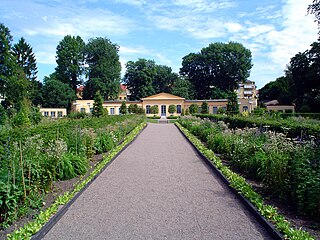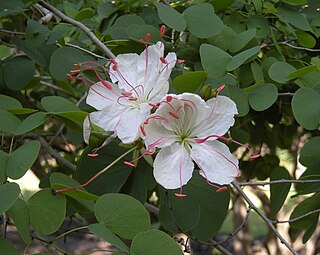Related Research Articles

Royal Botanic Gardens, Kew, is a non-departmental public body in the United Kingdom sponsored by the Department for Environment, Food and Rural Affairs. An internationally important botanical research and education institution, it employs 1,100 staff. Its board of trustees is chaired by Dame Amelia Fawcett.
Family is one of the eight major hierarchical taxonomic ranks in Linnaean taxonomy; it is classified between order and genus. A family may be divided into subfamilies, which are intermediate ranks between the ranks of family and genus. The official family names are Latin in origin; however, popular names are often used: for example, walnut trees and hickory trees belong to the family Juglandaceae, but that family is commonly referred to as being the "walnut family".

The Fabaceae or Leguminosae, commonly known as the legume, pea, or bean family, are a large and economically important family of flowering plants. It includes trees, shrubs, and perennial or annual herbaceous plants, which are easily recognized by their fruit (legume) and their compound, stipulate leaves. Many legumes have characteristic flowers and fruits. The family is widely distributed, and is the third-largest land plant family in number of species, behind only the Orchidaceae and Asteraceae, with about 751 genera and about 19,000 known species. The five largest of the genera are Astragalus, Acacia, Indigofera, Crotalaria, and Mimosa, which constitute about a quarter of all legume species. The ca. 19,000 known legume species amount to about 7% of flowering plant species. Fabaceae is the most common family found in tropical rainforests and in dry forests in the Americas and Africa.
In biology, a tribe is a taxonomic rank above genus, but below family and subfamily. It is sometimes subdivided into subtribes. By convention, all taxonomic ranks above genus are capitalized, including both tribe and subtribe.

The International Code of Nomenclature for algae, fungi, and plants (ICN) is the set of rules and recommendations dealing with the formal botanical names that are given to plants, fungi and a few other groups of organisms, all those "traditionally treated as algae, fungi, or plants". It was formerly called the International Code of Botanical Nomenclature (ICBN); the name was changed at the International Botanical Congress in Melbourne in July 2011 as part of the Melbourne Code which replaced the Vienna Code of 2005.

Peter Hamilton Raven is an American botanist and environmentalist, notable as the longtime director, now President Emeritus, of the Missouri Botanical Garden.

Altingiaceae is a small family of flowering plants in the order Saxifragales, consisting of wind-pollinated trees that produce hard, woody fruits containing numerous seeds. The fruits have been studied in considerable detail. They naturally occur in Central America, Mexico, eastern North America, the eastern Mediterranean, China, and tropical Asia. They are often cultivated as ornamentals and many produce valuable wood.

The International Association for Plant Taxonomy (IAPT) is an organization established to promote an understanding of plant biodiversity, facilitate international communication of research between botanists, and oversee matters of uniformity and stability in plant names. The IAPT was founded on July 18, 1950 at the Seventh International Botanical Congress in Stockholm, Sweden. Currently, the IAPT headquarters is located in Bratislava, Slovakia. Its current president, since 2017, is Patrick S. Herendeen ; vice-president is Gonzalo Nieto Feliner ; and secretary-general is Karol Marhold.
The Chicago Botanic Garden is a 385-acre (156 ha) living plant museum situated on nine islands in the Cook County Forest Preserves. It features 27 display gardens in four natural habitats: McDonald Woods, Dixon Prairie, Skokie River Corridor, and Lakes and Shores. The address for the garden is 1000 Lake Cook Road, Glencoe, Illinois. The garden is open every day of the year and admission is currently free - however, the Cook County Forest Preserve Board has approved an admission fee starting in 2022, not to exceed $35.

Chloranthaceae is a family of flowering plants (angiosperms), the only family in the order Chloranthales. It is not closely related to any other family of flowering plants, and is among the early-diverging lineages in the angiosperms. They are woody or weakly woody plants occurring in Southeast Asia, the Pacific, Madagascar, Central and South America, and the West Indies. The family consists of four extant genera, totalling about 77 known species according to Christenhusz and Byng in 2016. Some species are used in traditional medicine. The type genus is Chloranthus.

Randall James Bayer is an American systematic botanist, published mostly as "R.J. Bayer", who was born in Buffalo, New York, U.S.A.
The Botanical Society of America (BSA) represents professional and amateur botanists, researchers, educators and students in over 80 countries of the world. It functions as a United States nonprofit 501(c)(3) membership society.

Lysiphyllum is a genus of flowering plants in the legume family, subfamily Cercidoideae and tribe Bauhinieae. It belongs to the subfamily Cercidoideae. It was formerly treated as part of the genus Bauhinia, but recent molecular phylogenetic analysis confirms that Lysiphyllum is a distinct genus from Bauhinia.
Karl Joseph Niklas is the Liberty Hyde Bailey Professor emeritus in the Section of Plant Biology, School of Integrative Plant Science, at Cornell University. He is best known for his work on plant biomechanics, allometry, and functional morphology, and for his long-standing contributions to understanding plant evolutionary biology, particularly early land plant evolutionary diversification patterns and morphospaces.

The tribe Indigofereae is a subdivision of the plant family Fabaceae. It is consistently recovered as a monophyletic clade in molecular phylogenies. The Indigofereae arose 30.0 ± 3.3 million years ago.

The Systematics Association is a charitable organisation based in the UK founded in 1937 for the promotion of the study of systematics and taxonomy. It publishes research, organises conferences, and provides competitive research funds for systematics research.

The Mirbelioids are an informal subdivision of the plant family Fabaceae that includes the former tribes Bossiaeeae and Mirbelieae. They are consistently recovered as a monophyletic clade in molecular phylogenies. The Mirbelioids arose 48.4 ± 1.3 million years ago. Members of this clade are mostly ericoid (sclerophyllous) shrubs with yellow and red flowers found in Australia, Tasmania, and Papua-New Guinea. The name of this clade is informal and is not assumed to have any particular taxonomic rank like the names authorized by the ICBN or the ICPN. Members of this clade exhibit unusual embryology compared to other legumes, either enlarged antipodal cells in the embryo sac or the production of multiple embryo sacs. There has been a shift from bee pollination to bird pollination several times in this clade. Mirbelioids produce quinolizidine alkaloids, but unlike most papilionoids, they do not produce isoflavones. Many of the Mirbelioids have pseudoraceme inflorescences.

Sebsebe Demissew is a Professor of Plant Systematics and Biodiversity at Addis Ababa University and Executive Director of the Gullele Botanic Garden in Addis Ababa, Ethiopia.
Karen Louise Wilson is an Australian botanist.
James F. Steffen is an American ecologist with expertise in Midwestern United States flora and fauna.
References
- ↑ "Curriculum Vitae: Patrick Stephen Herendeen" (PDF). chicagobotanic.org. Chicago Botanic Garden. Retrieved 2018-09-22.
- ↑ "Patrick S. Herendeen, Ph.D." chicagobotanic.org. Chicago Botanic Garden. Retrieved 2018-09-22.
- ↑ "Herendeen, Patrick - Biography". pwrc.usgs.gov. Retrieved 2018-09-22.
- ↑ "IAPT - Council". iaptglobal.org. International Association for Plant Taxonomy. Retrieved 2018-09-22.
| This article about an American botanist is a stub. You can help Wikipedia by expanding it. |